Platform for Civic Media Literacy
The ability to access, use, analyse, create, and share information and media is essential for full participation in society. However, not all Australians have this ability, while many Australians do not have access to any media literacy support.
The Civic Media Literacy platform aims to support groups and communities in Australia that have been identified as being more likely to experience digital and media exclusion and/or have a lower level of media literacy.
By bringing together cultural institutions, government agencies, media organisations, civil society organisations, and citizens, this platform seeks to advance the ability of all citizens to use information, media and digital technologies to participate fully in society.
The platform also seeks to investigate problems that emerge because of poor and inappropriate media and technology design, distribution, and regulation, including misinformation, digital exclusion, political polarisation, media bias and racism.
This platform is part of the International Media and Information Literacy Institute and the Australian Media Literacy Alliance. It is led by Associate Professor Tanya Notley.
The Platform for Civic Media Literacy aims to ensure that media and digital literacy initiatives support citizens to:
- Engage with their democracy and communities
- Benefit from the knowledge economy and consumer choice
- Participate in lifelong learning and cultural expression opportunities
It will achieve this by:
- Carrying out research that will be published and presented in ways that are accessible to civic society organisations and the public
- Co-developing media and digital participation frameworks and guides to translate research into action
- Supporting communities of practice that seek to address inequalities and injustices in media and technology participation
Current Projects
Addressing Misinformation with Media Literacy through Cultural Institutions (2023-2026)
Misinformation can harm democratic processes, social cohesion and public health outcomes. Media literacy prepares citizens for misinformation by developing critical analysis abilities. This project partners with public cultural institutions to increase adult media literacy.
Through an action-based, mixed methods approach, the project investigates adults’ experiences with online misinformation and assesses their ability to identify and challenge it. Research findings will inform the design and evaluation of targeted evidence-based media literacy training and resources that will be shared across broadcast media, physical spaces and online.
Through these initiatives, Australians will be better equipped to combat misinformation. Funding has been provided by the Australian Research Council Linkage Program.
Project team: Tanya Notley (WSU), Michael Dezuanni (QUT), Sora Park (UC), Heather Ford (UTS), T.J. Thomson (RMIT)
Funder: Australian Research Council Linkage program
Partners: ABC Education, The Museum of Australian Democracy (MoAD), the National Film and Sound Archive of Australia (NFSA) and the Australian Library and Information Association (ALIA).
Understanding and Developing Media Literacy in Australia (2022-2023)
This project focuses on updating and implementing two national surveys. The first examines young Australians news engagement and news literacy. The second examines adult media engagement and media literacy. These surveys already provide important baseline data for media literacy advocates and practitioners. The survey updates will ensure the surveys remain relevant. Two survey reports will be released in 2023.
Project team: Tanya Notley, Simon Chambers, Flora Hua Zhong (WSU), Michael Dezuanni (QUT), Sora Park, Jee Lee (UC)
Funder: Meta Australia
Advancing Digital Inclusion in Low Income Australian Families (2021-current)
Families living on low incomes are among the least digitally included Australians and are at greater risk of broader social exclusion than other Australians. Digital ability and digital inclusion have been linked to a range of social and economic benefits. Australians who have adequate, affordable access to digital technologies and the knowledge and skills to use them, have better outcomes across life spheres including education, work, finance, health, and wellbeing.
This ethnographic investigation explores the complex relationship between digital and social inclusion, and social infrastructure’s role (education facilities, charities, government services) in supporting low income families in six diverse communities from Far North Queensland to Tasmania, across diverse urban, regional and rural locations. It focuses on the digital inclusion implications of children’s home and school learning experiences, school leavers’ transitions into work, and parenting in digital times.
Project team: Michael Dezuanni, Marcus Foth, Peta Mitchell, Amber Marshall, Kim Osman (QUT), Tanya Notley, Jasbeer Musthafa Mamalipurath (WSU), Jenny Kennedy, Anthony McCosker (RMIT), Anne Hampshire (The Smith Family).
Funder: Australian Research Council Linkage program
Partners: The Smith Family, Good Things Foundation, yourtown, Infoxchange and Leep.
For more information, please visit Advancing Digital Inclusion in Low Income Australian Families
The Australian Media Literacy Alliance (2020-current)
Media literacy has never been more important for citizens to survive and thrive. This Alliance brings together key national public institutions to tackle the challenges of media literacy education as a national priority.
Partners: ABC Education (ABC), Australian Library and Information Association (ALIA), Museum of Australian Democracy (MoAD), National Film and Sound Archive of Australia (NFSA), National and State Libraries Australasia (NSLA), The Special Broadcasting Service (SBS), Queensland University of Technology (QUT), Western Sydney University (WSU), First Nations Media, Special Broadcasting Service (SBS), Australia Centre for Moving Image (ACMI)
For more information, please visit The Australian Media Literacy Alliance
Recent Projects
A review of interventions and programmes that increase scientific literacy in public health emergencies (2022)
Translating science into messages, recommendations and actions that are easily comprehensible, accessible and relevant to different audiences is a vital element of health emergency preparedness. This project involves a systematic literature review on the concept of science literacy and its effective interventions.
Project team: Jed Montayre, Della Maneze, Tanya Notley (WSU) and Joan Leach (ANU)
Funder: World Health Organisation (WHO)
Adult Media Literacy in Australia Project (2020-2021)
The ability to access, analyse, evaluate, and create different forms of communication is essential for full participation in civic life. The Adult Media Literacy in Australia Project (2020-2021) investigated adult media literacy levels, needs and gaps in Australia. The research team implemented a national survey and carried out expert interviews. This research was then used to consult with 89 organisations from across Australia to develop a vision and plan for a national strategy for media literacy that will benefit all Australians. This project was a collaborative project with researchers in the United States.
Project team: Tanya Notley, Simon Chambers, Luigi Di Martino (WSU), Michael Dezuanni (QUT), Sora Park (UCanberra)
Funder: The National Association for Media Literacy Education (United States)
Partner: Australian Media Literacy Alliance (AMLA)
For more information, please visit Adult Media Literacy in Australia Project
Young Australians News Literacy Project (2018-2020)
Prior to this project, very little was known about young Australians’ news engagement and news literacy and no contemporary nationally representative data existed. A national survey of young people, a national survey of teachers and workshops were used to investigate and then advance the news media literacy of young Australians.
Funders/Partners: Phase 1: Crinkling News, Western Sydney University and Queensland University of Technology.
Phase 2: Museum of Australian Democracy (MoAD), Google Australia, Western Sydney University and Queensland University of Technology, ABC Education.
For more information, please visit Young Australians News Literacy Project
Public Engagement Research Impact since 2020
- Number of organisations who have participated: 104
- Number of media engagements: 275
- Number of people who have attended events: 280
- Number of projects: 7
- Number of project partner organisations: 18
Examples of Policy and Institutional Impact
- The media literacy framework we created with the Australian Media Literacy Alliance (AMLA) has been adopted and used by at least 10 organisations to inform media literacy programs and projects. This includes the National Film and Sound Archive of Australia who used it to design a new media literacy program, the Alannah and Madelaine Foundation who used it to inform their Media Literacy Lab and teacher training program and SquizKids who used it to create their News Literacy program, NewsHounds.
- Our research has been cited in numerous government inquiries. This includes the ACCC in their Digital Platform Inquiry final report (opens in a new window) where it was used to inform two recommendations to the government regarding media literacy. First, the ACCC recommended that the government review how media literacy is taught in schools as part of the National Curriculum Review. Second, the government invest in media literacy initiatives across the country.
- Our national survey of adult media literacy is being used to inform the Department of Infrastructure, Transport, Regional Development and Communications as they co-develop a strategic response to support adult media literacy.
- Our research has been used to guide changes to the 2023 Australian Curriculum relating to how media literacy is taught from year 1-10.
- Our research has been featured in a series of exhibitions and teacher publications. For example, our research on young people and news is featured in a semi-permanent exhibition at the Museum of Australian Democracy.
Events
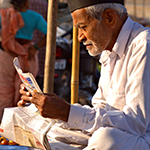 Examining the Problem of Mis/Disinformation Among Examining the Problem of Mis/Disinformation Among Indian Diasporic Communities in Australia (2022) | |
Selected Publications
Journal Articles
- Mamalipurath, J. M., & Notley, T. (2022). Muslim Responses to the COVID-19 Pandemic in Western Sydney: Understanding the Role of Community-Specific Communication Infrastructure. Journal of Intercultural Studies, 1-18.
- Notley, T., Zhong, H.F., Dezuanni, M., & Gilbert, S. (2022) ‘Comparing children’s and teens’ news engagement practices and affective news experiences’, Journal of Youth Studies. International Journal of Communication16(2022), 1–24.
- Chambers, S., Notley, T., Dezuanni, M., and Park S. (2022) ’Values and Media Literacy: Exploring the Relationship Between the Values People Prioritize in Their Life and Their Attitudes Toward Media Literacy’
- Notley, T., Chambers, S., Park, S., Dezuanni, M. (2021), Adult Media Literacy in Australia: Attitudes, Experiences and Needs. Research Report, Western Sydney University, Queensland University of Technology and University of Canberra.
- Notley, T. & Dezuanni, M (2019) ‘Advancing children’s news media literacy: learning from the practices and experiences of young Australians’, Media, Culture & Society, 41(5): 689-707.
Reports
- Mamalipurath, J. M. (2023). Examining the Problem of Misinformation among the Indian Diaspora in Australia (opens in a new window). Western Sydney University. https://doi.org/10.26183/a6z9-dp19
- Notley, T., Chambers, S., Park, S., Dezuanni, M. (2021) Adult Media Literacy in Australia: Attitudes, Experiences and Needs. Western Sydney University, Queensland University of Technology and University of Canberra.
- Park, S., Lee. J. Y., Atkinson, S and Su, J. (2021) Media Literacy in Australia: A Qualitative Study. Canberra: News & Media Research Centre, University of Canberra.
- Dezuanni, M., Notley. T., Di Martino, L. (2021) Towards a National Strategy for Media Literacy. Research report. Australian Media Literacy Alliance.
- Notley, T., Dezuanni, M., Zhong, H.F. & Chambers, C. (2020) News and Australian Children in 2020: How young people access, perceive and are affected by news media, Research Report, Sydney, Western Sydney University and Queensland University of Technology.
- Chitranshi, B. (2020) Young People and News Engagement in 2020. Survey Report. Western Sydney University, Queensland University of Technology and the Museum of Australian Democracy.
- Dezuanni, M., Notley, T. & Corser, K. (2020) News and Australian Teachers: How news media literacy is taught in the classroom. Brisbane: Queensland University of Technology and Western Sydney University.
- Notley, T., Dezuanni, M. & Zhong, H.F. (2019) ‘The inclusion and representation of young people in the Australian news media’, Research report, Western Sydney University and Queensland University of Technology.
- Notley, T., Dezuanni, M,, Zhong, H,F, & Howden, S. (2017) News and Australia’s children: how young people access, perceive and are affected by the news, Research Report, Sydney, Crinkling News, Western Sydney University and Queensland University of Technology.
The Conversation articles
- Notley, T., Chambers, S., Park, S., Dezuanni, M. (2021) Less than half of Australian adults know how to identify misinformation online, The Conversation.
- Notley, T. & Dezuanni, M. (2020) ‘3 ways to help children think critically about the news’, The Conversation.
- Notley, T. & Dezuanni, M. (2020) ‘We live in an age of ‘fake news’. But Australian children are not learning enough about media literacy’, The Conversation.
- Notley, T. & Dezuanni, M. (2019) ‘On an average day, only 1% of Australian news stories quotes a young person. No wonder so few trust the media’, The Conversation.
- Notley, T. & Dezuanni, M. (2017) ‘Most young Australians can’t identify fake news online’, The Conversation.
Guides and frameworks
- Notley, T. and Thomson, T.J. (2020) What is misinformation and how can media literacy combat it?, Australian Associated Press (AAP).
- Thomson, T.J. and Notley, T. (2020) How do you know what information sources to trust?, Australian Associated Press (AAP).
- Thomson, T.J. and Notley, T. (2020) How do you fact-check an image?, Australian Associated Press (AAP).
- Notley, T. and Dezuanni, M. (2020) Media Literacy Framework, Western Sydney University and Queensland University of Technology.
- Notley, T. (2020) ‘“Disaster coverage” in the news has overwhelmed young Australians in 2020.’ ABC Education website. December 15 2020.
- Dezuanni, M., Notley, T. (2019) Studying the news through the Australian Curriculum: A brief guide for teachers. Brisbane: Queensland University of Technology and Western Sydney University.
- Dezuanni, M. (2019) ‘Use The News: In the English classroom’, ABC Education website.
- Dezuanni, M. (2019) ‘Use The News: In media arts or across the curriculum’, ABC Education website.
Visiting Fellows
Marina Botelho, Visiting Research Fellow 2023-2024
 Marina Botelho is a PhD research candidate at the Universidade Paulista (UNIP) in Brazil, where she holds a research fellowship. She is currently working on media literacy games for young people, specifically role-playing games (RPGs). She completed her Master Degree in Education degree (UFLA), where she worked on media literacy in early teacher education, in relation to Brazilian cinema. She is a specialist in Cinema and Audiovisual Language and has a Bachelor Degree in Communication (UFJF). Marina has dedicated the last few years to studying the Brazilian political scene during the Covid-19 pandemic, focusing on fake news and disinformation in social media, with some parallel studies on games for educational purposes and film. She has worked as a professor in several universities, as a journalist and as a writer. In 2023-2024 Marina will be at Western Sydney University to continue her research on media literacy for young people, comparing Brazilian and Australian needs and contexts. She will also contribute to ARC Project, Addressing Misinformation with Media Literacy Through Public Cultural Institutions.
Marina Botelho is a PhD research candidate at the Universidade Paulista (UNIP) in Brazil, where she holds a research fellowship. She is currently working on media literacy games for young people, specifically role-playing games (RPGs). She completed her Master Degree in Education degree (UFLA), where she worked on media literacy in early teacher education, in relation to Brazilian cinema. She is a specialist in Cinema and Audiovisual Language and has a Bachelor Degree in Communication (UFJF). Marina has dedicated the last few years to studying the Brazilian political scene during the Covid-19 pandemic, focusing on fake news and disinformation in social media, with some parallel studies on games for educational purposes and film. She has worked as a professor in several universities, as a journalist and as a writer. In 2023-2024 Marina will be at Western Sydney University to continue her research on media literacy for young people, comparing Brazilian and Australian needs and contexts. She will also contribute to ARC Project, Addressing Misinformation with Media Literacy Through Public Cultural Institutions.
Sherri Hope Culver, Fullbright Scholar 2022-2023
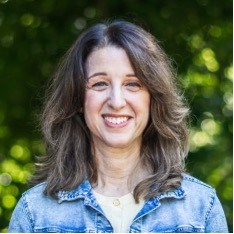 Sherri Hope Culver serves as Director of the Center for Media and Information Literacy at Temple University, USA where she is an Associate Professor in the Klein College of Media and Communication. Prior to her academic appointment, Sherri worked in the media industry for over 25 years as a producer and television executive. Her industry experience ranges from serving as a reporter for a public television news organisation to writing and producing educational programs for young viewers. She currently produces and hosts the television series, Media Inside Out and the podcast series, Kids Talk Media. In 2022-2023 Sherri will spend time at Western Sydney University as a Fulbright Scholar to study children’s television in Australia, Brazil and the UK.
Sherri Hope Culver serves as Director of the Center for Media and Information Literacy at Temple University, USA where she is an Associate Professor in the Klein College of Media and Communication. Prior to her academic appointment, Sherri worked in the media industry for over 25 years as a producer and television executive. Her industry experience ranges from serving as a reporter for a public television news organisation to writing and producing educational programs for young viewers. She currently produces and hosts the television series, Media Inside Out and the podcast series, Kids Talk Media. In 2022-2023 Sherri will spend time at Western Sydney University as a Fulbright Scholar to study children’s television in Australia, Brazil and the UK.
Stephanie Niu, Fullbright Scholar 2023
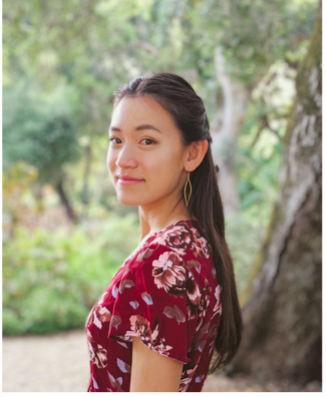 Stephanie Niu is a poet and author of She Has Dreamt Again of Water, winner of the 2021 Diode Chapbook Prize. She received her degrees in symbolic systems and computer science from Stanford University. Her poems have appeared in Southeast Review, Poets Readings the News, Breakwater Review, and Storm Cellar, as well as scientific collaborations including the 11th Annual St. Louis River Summit. Stephanie will spend time at Western Sydney University as a Fulbright Scholar to focus on decolonizing historical narratives through digital techniques, including podcast production, map-making, and digital visualization. Stephanie will specifically examine Chinese mine laborers on Christmas Island.
Stephanie Niu is a poet and author of She Has Dreamt Again of Water, winner of the 2021 Diode Chapbook Prize. She received her degrees in symbolic systems and computer science from Stanford University. Her poems have appeared in Southeast Review, Poets Readings the News, Breakwater Review, and Storm Cellar, as well as scientific collaborations including the 11th Annual St. Louis River Summit. Stephanie will spend time at Western Sydney University as a Fulbright Scholar to focus on decolonizing historical narratives through digital techniques, including podcast production, map-making, and digital visualization. Stephanie will specifically examine Chinese mine laborers on Christmas Island.
Media Resources
Media Literacy Research Symposium Presentation Videos
‘Civic Media Literacies: Pursuing equitable and just civic futures in a time of rampant media cynicism’, Associate Professor Paul Mihailidis, Emerson College, Boston
Missing: Young People in Australian News Media, Izzy Tolhurst, Foundation For Young Australians (FYA)
Panel events
Sydney: ‘Using media literacy to confront the impact of disinformation on our democracy’
Canberra: ‘News, misinformation and media literacy’
Brisbane: ‘Media Literacy’s many tasks – promoting critical engagement with digital platforms’
Media Coverage
Highlights:
- 25 Oct 2022. ABC Radio National interviewed Associate Professor Tanya Notley for the Whose Gonna Save Us podcast about data centers and undersea cables and the energy it takes to keep us online.
- 14 Feb 2022. Tanya Notley’s online article about misinformation and media literacy is republished in The Week, newsroom, eastmojo and Devdiscourse.
- 26 Jan 2022. ABC PM program interview Tanya Notley about misinformation on Spotify and other social media platforms.
- 24 Dec 2021. Reuters interview Tanya Notley about platforms and news regulation.
- 8 Oct 2021. ABC Radio National interview Tanya Notley for an interactive online article about spotting misinformation.
- 12 Aug 2021. Triple J interview Tanya Notley on the value of media literacy to address misinformation.
- 7 July 2020. Live interview with Tanya Notley and News Champion. Isabelle Gonzalez, Radio Adelaide 101.5, Breakfast program.
- 6 July 2020. ‘Just one in five students learning media literacy, as news consumption rises’, Sydney Morning Herald. Online and in print article reports on our national survey and includes an interview with Tanya Notley and News Champion, Maitreyi Kulkarni (republished in The Age (online and print), Brisbane Times, WAToday .
- 6 July 2020. Interview with Tanya Notley about young people and news survey findings, Radio National, PM program (syndicated to more than 50 stations nationwide).
- 10 Sept 2018. Tanya Notley is interviewed (with Annabel Astbury, ABC) on ABC’s Life Matters (for media Literacy week).
- 30 Nov 2017. Can Kids Tell Real News from Fake? 2SER Breakfast program, http://2ser.com/can-kids-tell-real-news-fake/
- Further Media Coverage is listed here.
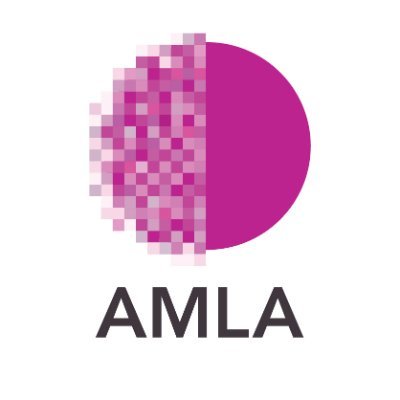
 Media (literacy) in a hyper-mediated world (2022)
Media (literacy) in a hyper-mediated world (2022)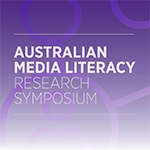
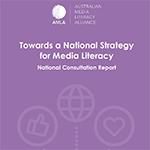 Consultations for a National Media Literacy Strategy (2021)
Consultations for a National Media Literacy Strategy (2021)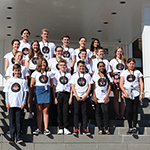 News Champions Forum for Young Australians (2019)
News Champions Forum for Young Australians (2019)



